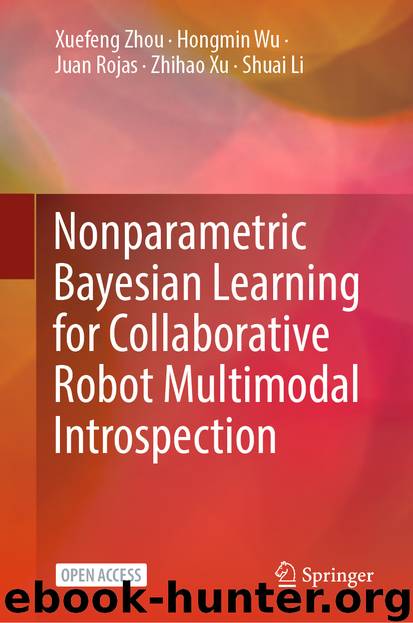Nonparametric Bayesian Learning for Collaborative Robot Multimodal Introspection by Xuefeng Zhou & Hongmin Wu & Juan Rojas & Zhihao Xu & Shuai Li

Author:Xuefeng Zhou & Hongmin Wu & Juan Rojas & Zhihao Xu & Shuai Li
Language: eng
Format: epub
ISBN: 9789811562631
Publisher: Springer Singapore
This work showed the ability of a system to recover from unmodeled and accidental external disturbances that can’t be anticipated. Such disturbances will be more common in shared human-robot workspaces. Our work demonstrated that our recovery strategy in connection with our previous introspection framework recovered 88% of the time from accidental human and tool collisions under single-anomaly and multiple-anomaly scenarios per node. The results indicate the system can recover at any part of the task, even when it is abused and multiple anomalies occur consecutively. From the videos in [21], we can see that even when in cases where the robot is in constant duress, the robot recovers consistently. Such robustness will play a role in enabling robots have increasing levels of long-term autonomy.
We by using a more expressive model to do robot introspection, our recovery ability also increased. We will continue to explore improved models that can better capture spatio-temporal relationships of high-dimensional multi-modal data. As well as looking for representations that scale over time in order to acquire a useful and practical library of skill identification and motion generation.
Yet there is much work to be done. Manual annotations for state-dependency are an important weakness. Crucially we wish to move towards modeling human understanding for decision making in the midst of robot-object-environment interactions. Scalability is an important factor in this domain as the system must scale to ever growing number of learned tasks. Learning how anomalies and recovery decisions are made and re-used across similar scenarios will be important. The manual approach will not scale. Adaptability and not only reverting is also important. Incremental learning is also key. The current work is limited to reverting. By simply revering we don’t model recovery behaviors and also do not learn how to adapt. We also cannot handle new scenarios. We must develop action-confidence metrics that let us learn new scenarios on demand.
Download
This site does not store any files on its server. We only index and link to content provided by other sites. Please contact the content providers to delete copyright contents if any and email us, we'll remove relevant links or contents immediately.
Algorithms of the Intelligent Web by Haralambos Marmanis;Dmitry Babenko(17562)
Jquery UI in Action : Master the concepts Of Jquery UI: A Step By Step Approach by ANMOL GOYAL(10025)
Test-Driven Development with Java by Alan Mellor(7749)
Data Augmentation with Python by Duc Haba(7624)
Principles of Data Fabric by Sonia Mezzetta(7393)
Learn Blender Simulations the Right Way by Stephen Pearson(7306)
Microservices with Spring Boot 3 and Spring Cloud by Magnus Larsson(7155)
Hadoop in Practice by Alex Holmes(6689)
RPA Solution Architect's Handbook by Sachin Sahgal(6530)
The Infinite Retina by Robert Scoble Irena Cronin(6233)
Big Data Analysis with Python by Ivan Marin(5953)
Life 3.0: Being Human in the Age of Artificial Intelligence by Tegmark Max(5534)
Pretrain Vision and Large Language Models in Python by Emily Webber(4914)
Infrastructure as Code for Beginners by Russ McKendrick(4667)
Functional Programming in JavaScript by Mantyla Dan(4506)
WordPress Plugin Development Cookbook by Yannick Lefebvre(4404)
The Age of Surveillance Capitalism by Shoshana Zuboff(4268)
Embracing Microservices Design by Ovais Mehboob Ahmed Khan Nabil Siddiqui and Timothy Oleson(4160)
Applied Machine Learning for Healthcare and Life Sciences Using AWS by Ujjwal Ratan(4150)
